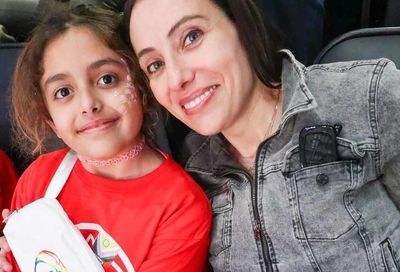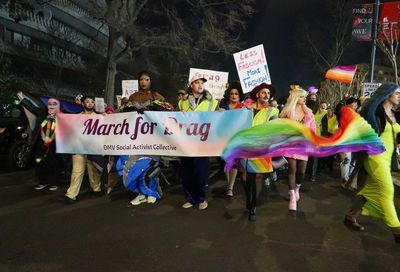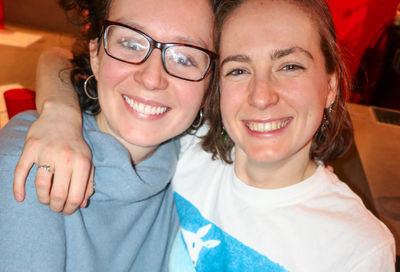Man of The Hours
Michael Cunningham's Unlikely Runaway Smash
Photography by Michael Wichita
 |
Michael Cunningham likes genre fiction — spy stories, romances, thrillers, sci-fi. Stuff you’d buy in an airport along with a copy of USA Today and Details.
“The book I’m working on now is three interrelated novellas, each in a different genre. There’s a gothic horror story, a thriller and a science fiction. And they’re each about Walt Whitman. ”
Say what?
“In the thriller, Walt’s a terrorist who wants to bomb the world back to a state of innocence. And in the sci-fi, he’s a nuclear scientist. Somehow, it just felt right. ”
In case you’re confused, this is the man who wrote the talky, profoundly poignant The Hours, which garnered a Pulitzer and spawned a movie that, on Sunday, won the Golden Globe for Best Dramatic Film. Spanning three eras, The Hours traces a day in the lives of three different women. One of those women is Virginia Woolf, struggling to produce a first sentence for her novel, Mrs. Dalloway.
Though his über-literary fans may raise their noses at the Whitman project, Cunningham has no intentions of scribbling out some pulp paperback throwaway.
“People are getting something out of those pulpy books that’s worthwhile, ” he says. “They feel like grown up versions of the fairy tales we loved when we were kids, when we didn’t care about jobs and apartments. We cared about witches and dragons and treasure, and these books are descendants of those stories. ”
Cunningham’s stardom continues to rise. He’s written a screen adaptation for his 1990 novel, A Home at the End of the World. And The Hours is virtually guaranteed multiple Oscar nominations, including Best Film and Best Actress for Nicole Kidman, whose stunning portrayal of Virginia Woolf has received raves.
“I asked Nicole if she’d be willing to play Walt Whitman, ” laughs Cunningham. “She said, ‘Absolutely.’ ”
It’s tempting to call Michael Cunningham the moment’s hot writer, but to do so would depreciate his staying power. This is the man, after all, who has American audiences rushing to theaters for a complex film about a long-dead author whom the average person has never actually read.
“You never know what’s going to hit and what’s going to miss, ” he says. “I lucked out. ”
METRO WEEKLY: Congratulations on the success of the film. Were you happy with the adaptation?
MICHAEL CUNNINGHAM: Very happy. [Screenwriter] David Hare tried it a lot of different ways, but the final version ended up resembling the book much more closely than I think he intended.
MW: All three of the actresses who played the lead roles are receiving rave reviews.
CUNNINGHAM: I know, I still can’t believe all of those great people were in this movie. And not only in the major roles. There were so many amazing actors who were only in there for one scene. Toni Collette, Jeff Daniels. I thought Clare Danes was great. And Eileen Atkins as the flower shop keeper — what a fantastic English actress.
|
MW: When I heard they were making The Hours into a movie, I was a little skeptical. The book is great, but not much actually happens in it. It didn’t seem like it would translate to film.
CUNNINGHAM: It’s true. There are no sex scenes or car chases and it’s full of lesbians. And not even lesbians doing things that straight boys could jerk off to. And yet, there it went. But I think the idea that it would be difficult to make a movie about any given novel is a testament to the novel itself. It shows that it wasn’t just some movie-in-the-making. It was a completed thought.
MW: It’s amazing that people are so excited about a movie that pays homage to a dense, difficult book written in the Victorian era. Why write a book that mirrors Mrs. Dalloway?
CUNNINGHAM: Mrs. Dalloway was the first great book I ever read. I read it to impress this older girl who was the pirate queen of our high school — everyone was terrified by her and in love with her. The book really knocked me out. I had no idea that you could do that with just ink and paper. I was only fifteen and couldn’t even really tell what it was about, but I could see the complexity and music of the language. It was the book that made me start to read, and as I got older I started trying to write myself. I wanted to write about Mrs. Dalloway, but I thought, who wants to read a book about reading a book? But then I thought, I might want to read a book about reading a book — about reading the right book, about how important reading a book can be to somebody. Hence, The Hours.
I never expected it to be a hit, and my editor felt the same way. We thought this would be my arty little book that would sell a few thousand copies. But it got really nice reviews and started to sell, and then to everyone’s astonishment, won that prize. And then to my further complete astonishment, the movie.
MW: All of your books contain gay characters, but the characters’ sexualities in The Hours seem much more ambiguous, particularly Laura Brown’s. I was thrown off by her kiss with Kitty.
CUNNINGHAM: It felt important to me that none of the main characters in the Hours be easily classifiable as either straight or gay. Clarissa: She’s a lesbian, but the love of her life is a man. Virginia: Sex was too hard for Virginia. Eating was too hard for Virginia. Anything of the body was too hard for her. She and her husband Leonard had sex a couple of times early in their marriage and then couldn’t anymore. And, of course, she had her famous affair with Vita Sackville-West, but even they only had sex a couple of times.
MW: And Laura?
CUNNINGHAM: Laura certainly has big, complicated feelings for other women, but I didn’t want her to be anything quite as simple as a lesbian living a lie. She is certainly attracted to Kitty. She also loves her husband, but in the end, she doesn’t love him enough. One of the things I’ve learned as a gay man is how idiosyncratic our sexualities are. The longer I live, the more I feel that straight, gay and bisexual are so general as to be almost useless in telling you anything significant about the person you’re about to meet.
MW: But Laura’s son Richie certainly plays into that stereotype of the gay mama’s boy.
CUNNINGHAM: Yes, but it’s still a stereotype. When I gave my editor the manuscript for Flesh and Blood, I said I was nervous about the fact that the family includes a neurotic, obsessive, overly attached mother and a difficult, mostly absent father. I said I didn’t want to perpetuate the pernicious theory of the type of family that produces gay children. And my editor responded, “But everyone’s family is like that! ” I think it feels like that’s the type of family that produces gay children because with gay kids, we’re looking for that. With the straight boys, we’re just not checking, but their families are like that, too.
|
MW: Mother/son relationships seem to be an important theme in all your books. They’re often so intense that they lead to problems. Did you have a particularly intense relationship with your mother?
CUNNINGHAM: I had an intense relationship with both of my parents. I think my mother and I both felt like prisoners in that house. I feel like some of the closeness between my mother and me resembled the closeness that exists between prisoners in a jail cell. She was like so many women of her generation, stuck in a life that was too small for her. She just had bigger capacities than could be met by keeping a house and cooking the meals, but it was what she felt like she had to do. Almost as long as I can remember, I’ve had this sense of her as some kidnapped Amazon queen forced to live on the island of the cheerful white people.
MW: That sounds exactly like the character of Laura Brown. Is she fashioned after your mother?
CUNNINGHAM: None of my characters are directly biographical, but I drew on my mother’s life for Laura Brown. Jonathan in A Home at the End of the World is somewhat autobiographical. But then, so is Virginia Woolf.
MW: And little Richie? If Laura is drawn from your mother, is Richie drawn from you?
CUNNINGHAM: Somewhat. To write about somebody, I need to get to a point of intimacy with them so that, in a sense, they all feel autobiographical. I know writers who only base things on reality and I know writers who purely invent. I’m somewhere between the two.
MW: Originally, suburbs like Laura’s were seen as the idyllic American Dream, but these days, a lot of people see them as having a bit of sinister mystique. This is certainly the case in The Hours. Do you see the suburb you grew up in that way?
CUNNINGHAM: My suburb’s general intention was to completely eliminate surprise, sex and death. They didn’t exist, and so we lived in a kind of cheerful limbo.
It feels important to mention that I was hugely privileged to grow up a healthy white boy with money. On one level, to complain about that is absurd. It’s almost obscene, given how most people live. But yes, my suburb was all white, upper-middle class and Republican. It was a little like a living death.
MW: But the suburbs in your books never quite manage to eliminate the unpleasantries that they set out to, and so when something bad does happen it feels that much more shocking. For instance, in A Home at the End of the World when the kid accidentally runs through the slider door and bleeds to death.
CUNNINGHAM: And that’s a true story, actually. When I was in the eighth grade, there was a party where this guy — one of those rock ‘n roll hero-type boys everybody loves — ran outside to chase away some kids who were throwing stones at the house. When he ran back in, someone had closed the slider door, but he didn’t see the glass. He ran right through it and died. That’s always stayed with me. So these suburbs, they don’t work. They’re trying hard, but they don’t work. And I don’t think the place I grew up is substantively different than a suburb anywhere else. They’re kind of their own nation within the nation.
MW: So much of your writing seems to be based on real events like that one. Why didn’t you go into journalism?
CUNNINGHAM: Journalism was my first major in college, but honestly, I just wasn’t very good at it. So I switched from journalism to literature, which is such a stupid thing to major in. You don’t major in it, you just read. But it was the only thing I felt sufficiently interested in, and you have to do what you’re good at.
 |
MW: But you didn’t actually write your first book, Golden States, until you were almost thirty.
CUNNINGHAM: Yes. I was about to turn thirty and I realized I had spent most of my twenties pissing around, saying I was a writer, starting books, getting fifty pages in, deciding it was terrible and then starting a new one. I had ten false starts and I decided I just had to finish something before I turned thirty — good, bad or indifferent. And I wrote Golden States in about three weeks. And it was published.
MW: You’ve basically erased that book from existence by taking it out of print and not listing it with your other novels. The copies that still exist sell for around a hundred dollars on eBay now.
CUNNINGHAM: Golden States did me a lot of good. It got me off my ass. But it’s not a good enough book. I feel like there are too many books out there that are the product of writers not writing their best, and I was never happy about having contributed another “okay ” book to the stack. I don’t try to conceal its existence, but at the same time, I think that the world should just forget about it. Anyone who has the time and energy to read a book should read something else because no matter how much we read, we’re not going to have time to get around to all the books that we should read. Every book that we read takes the place of some other book, and the message I want to give is, just don’t bother with this one. In its place, read Scarlet and Black or The Swimming-Pool Library.
MW: Do you think you just started too early? There’s such a slew of hot young writers these days, all these Christopher Rice types, who have bestsellers published by the time they’re twenty-five.
CUNNINGHAM: What I learned is, I was wrong to be in such a hurry. Some of us have novels ready to come out when we’re nineteen, some of us aren’t ready till we’re sixty. Most of us fall somewhere between those two poles. Thirty seemed significant to me then, but it wasn’t at all. I think when the time comes, it’s better not to publish at all than to publish a book you weren’t ready to write, because once you put that book out, it’s there forever. Sometimes when I read the work of talented younger writers, I think to myself, just wait ten years. Any life can provide more than enough material for a novel.
|
Related Articles Home Making – |
Support Metro Weekly’s Journalism
These are challenging times for news organizations. And yet it’s crucial we stay active and provide vital resources and information to both our local readers and the world. So won’t you please take a moment and consider supporting Metro Weekly with a membership? For as little as $5 a month, you can help ensure Metro Weekly magazine and MetroWeekly.com remain free, viable resources as we provide the best, most diverse, culturally-resonant LGBTQ coverage in both the D.C. region and around the world. Memberships come with exclusive perks and discounts, your own personal digital delivery of each week’s magazine (and an archive), access to our Member's Lounge when it launches this fall, and exclusive members-only items like Metro Weekly Membership Mugs and Tote Bags! Check out all our membership levels here and please join us today!






















